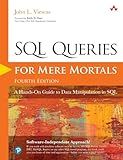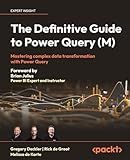Best Database Query Books to Buy in February 2026

Old Country



Cosmic Queries: StarTalk's Guide to Who We Are, How We Got Here, and Where We're Going



SQL Queries for Mere Mortals: A Hands-On Guide to Data Manipulation in SQL



The Definitive Guide to Power Query (M): Mastering complex data transformation with Power Query



Power Query Beyond The User Interface: Solving Advanced Data Cleaning Problems Using M



Master Your Data with Power Query in Excel and Power BI: Leveraging Power Query to Get & Transform Your Task Flow



Irresistible Query Letters: 40+ Real World Query Letters With Literary Agent Feedback



Collect, Combine, and Transform Data Using Power Query in Excel and Power BI (Business Skills)


The Oracle LIKE operator is used to search for a specified pattern in a column. It is commonly used in queries to retrieve data that matches a certain pattern or contains a specific substring.
The syntax for using the LIKE operator in a query is: SELECT column1, column2, ... FROM table WHERE column LIKE pattern;
In the syntax, "column" refers to the column you want to search, "table" is the name of the table, and "pattern" is the pattern you want to match.
The pattern can contain special characters known as wildcards to represent unknown or variable portions of the data. The two common wildcards used with the LIKE operator are:
- % - This wildcard represents any number of characters (zero or more) in the specified position. For example, if you use 'a%' as the pattern, it will match any value in the column that starts with the letter 'a', followed by any other characters.
- _ - This wildcard represents a single character in the specified position. For example, if you use 'a_e' as the pattern, it will match any value in the column that starts with 'a', followed by any single character, and ends with 'e'.
It's important to note that the LIKE operator is case-sensitive by default. If you want to perform a case-insensitive search, you can use the UPPER or LOWER functions to convert the column and pattern to the same case.
Here's a simple example: SELECT name FROM employees WHERE name LIKE 'J%';
This query will retrieve all the names from the "employees" table that start with the letter 'J'.
In conclusion, the Oracle LIKE operator is a powerful tool for searching and matching patterns in a column. It allows you to specify wildcards to facilitate flexible and efficient data retrieval based on specified patterns or substrings.
How to use the Oracle LIKE operator to search for strings with a specific length?
To use the Oracle LIKE operator to search for strings with a specific length, you can use the underscore (_) wildcard character to represent any single character in the string. You need to repeat the underscore character as many times as the desired length of the string.
Here's an example SQL query that demonstrates this:
SELECT column_name FROM table_name WHERE column_name LIKE '_____' -- Replace with the desired length
In this example, the underscore character is repeated five times to search for strings with a length of five characters. If you want to search for strings with a different length, change the number of underscore characters accordingly.
How to use the Oracle LIKE operator to search for strings that match multiple patterns?
To use the Oracle LIKE operator to search for strings that match multiple patterns, you can use the "%" wildcard to represent any number of characters, and the "_" wildcard to represent a single character.
Here's an example of how you can use the LIKE operator to search for strings that match multiple patterns:
SELECT column_name FROM table_name WHERE column_name LIKE 'pattern1' OR column_name LIKE 'pattern2' OR column_name LIKE 'pattern3';
In this example, replace 'pattern1', 'pattern2', and 'pattern3' with the specific patterns you want to search for. You can use the "%" and "_" wildcards in these patterns.
For example, if you want to search for strings that start with 'abc' followed by any number of characters, or strings that start with a digit followed by any character, you can use the following query:
SELECT column_name FROM table_name WHERE column_name LIKE 'abc%' OR column_name LIKE '[0-9]%';
In this example, 'abc%' matches any string that starts with 'abc' followed by any number of characters, and '[0-9]%' matches any string that starts with a digit followed by any character.
You can also combine multiple patterns using the OR operator to search for strings that match any of the patterns.
How to use the Oracle LIKE operator with multiple conditions in a query?
To use the LIKE operator with multiple conditions in an Oracle query, you can use the OR logical operator to specify multiple conditions. Here's an example:
SELECT column1, column2 FROM table WHERE column1 LIKE '%condition1%' OR column1 LIKE '%condition2%';
In this example, the query will return rows where column1 matches either 'condition1' or 'condition2' using the LIKE operator with the OR logical operator.
You can also use other logical operators such as AND to combine multiple conditions:
SELECT column1, column2 FROM table WHERE (column1 LIKE '%condition1%' OR column1 LIKE '%condition2%') AND column2 LIKE '%condition3%';
In this example, the query will return rows where column1 matches either 'condition1' or 'condition2', and column2 matches 'condition3' using the LIKE operator with the OR and AND logical operators.
Note that the '%' wildcard symbol is used in the LIKE operator to represent any string of characters.
What is the difference between the Oracle LIKE operator and the IN operator?
The Oracle LIKE operator and IN operator are both used to filter data in SQL queries but with different functionalities:
- LIKE Operator: The LIKE operator is used for pattern matching in strings. It identifies matching patterns by using wildcard characters like '%', '_', etc. The '%', for example, matches any sequence of characters, while '_' matches any single character. The LIKE operator is primarily used with the WHERE clause to specify a search condition. Example: SELECT column_name FROM table_name WHERE column_name LIKE 'pattern';
- IN Operator: The IN operator is used to specify multiple values in a WHERE clause. It allows you to provide a list or subquery as input and checks if a value matches any of the provided values. It is commonly used to replace multiple OR conditions in a query, making the syntax more concise. Example: SELECT column_name FROM table_name WHERE column_name IN ('value1', 'value2', 'value3');
In summary, the LIKE operator performs pattern matching on strings, while the IN operator checks if a value matches any value in a list.
